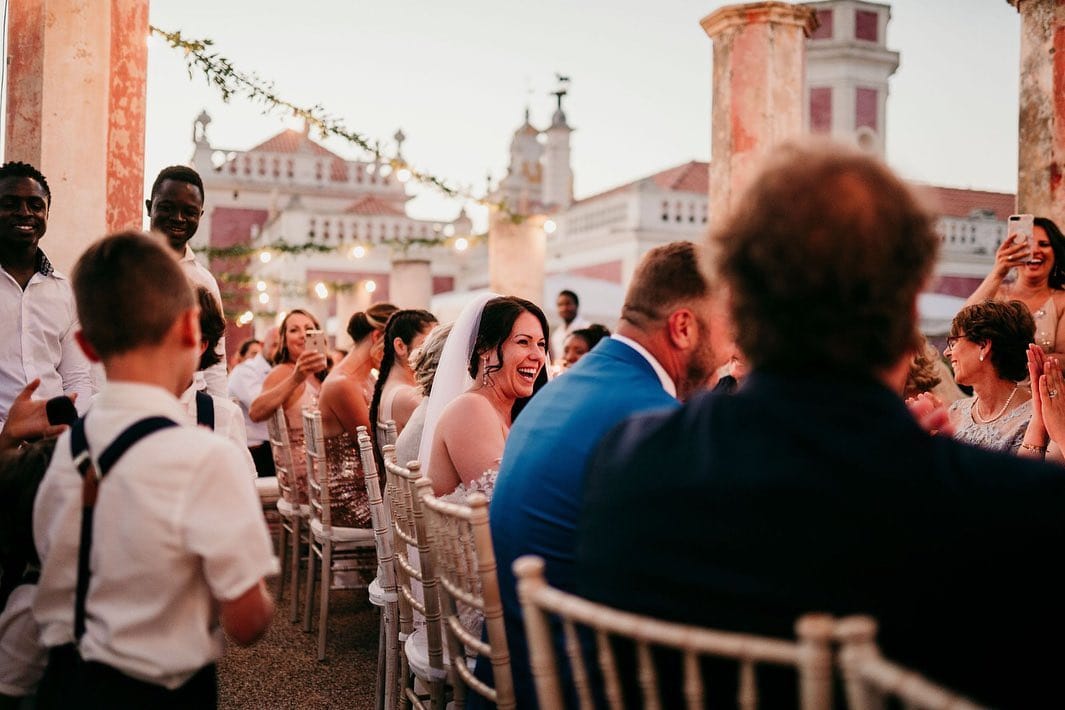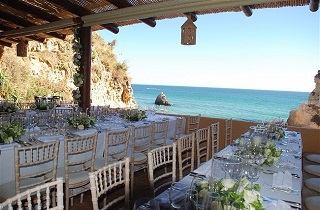The legal requirements for getting married in Portugal are relatively easy and straightforward, however many couples choose to have a civil ceremony in their own country and then hold a religious or symbolic ceremony in Portugal.
The necessary documentation and the process to be followed in respect of the legal requirements for getting married in Portugal are outlined below. Please keep in mind that this is intended to be a starting point and guideline only.

Image via Algarve Dream Weddings
Although much care and effort has been taken to ensure the information provided is correct please do not take it as legal advice. With all the recent changes, especially with Brexit – we suggest you contact a qualified lawyer / solicitor or wedding planner to advise on the legal requirements for getting married in Portugal.
Note: Required documentation and the legal process varies from nationality to nationality.
Essential Facts
- Civil or Catholic ceremonies are the only legally binding type of ceremony in Portugal.
- Civil ceremonies can take place in most locations,
- A beach wedding will require a license from the maritime police and the local council.
- There is no minimum residency period.
- Civil ceremonies are conducted in Portuguese, however depending on the town where you are getting married they can be conducted in English or French.
- You are required to have a translator present if either of the couple does not speak Portuguese .
- You may have a religious ceremony of any other faith after a civil ceremony has taken place, either in Portugal or in your own country, your marriage certificate should be made available.
- Same-sex weddings have been legally recognised in Portugal since 2010.
- It usually takes a minimum of four weeks to process a Marriage Licence / Application and once approved, your marriage must occur within six months.
Important Note: UK Nationals
Since Brexit UK Nationals are now required to obtain a Certificate of No Impediment, this applies for marriages between both opposite sex and same-sex couples.
Legality of Marriage
Marriages performed in Portugal are internationally recognised and legally binding, however some countries may require a second marriage / permission.
Residency Requirements
There is no minimum residency requirements for foreign nationals wishing to get married in Portugal.
Marriage Licence / Application
You are obliged to have legal representation (it must be a local lawyer / solicitor) to apply for a marriage licence from one of the Civil Registry Offices (Conservatória do Registo Civil) in Portugal.
You will be required to indicate if you are having a civil or Catholic wedding, the day, time, and location of your wedding, as well as your chosen matrimonial regime (prenuptial agreement).
A representative with power of attorney can liaise with the Registrar and act on your behalf, or a priest if you are having a Catholic wedding. If you are organising your own wedding, we highly recommend using a wedding planner or local lawyer in this regard.
Required Documentation
All documentation is required to be original. You may request documentation in “international” form so there is no need to have it translated into Portuguese by the relevant authorities. This is the case with the Certificate of No Impediment and birth certificate.
Your Certificate of No Impediment / Certificate of Freedom to Marry and full birth certificates must not be older than 6 months and must be apostilled.
All documentation must be submitted to the Registrar at least one month prior to your wedding taking place, however we suggest allowing a minimum of 3 months for processing. If you are using a wedding planner they will organise this on your behalf.
If you are organising your own wedding you will need to make provisions to have legal representation as doing the legalities on your own is no longer possible.
The following documentation for both the bride and groom is required to be presented when applying for a marriage licence in Portugal.
- Certificate of No Impediment / Certificate of Freedom to Marry bearing the stamp apostille.
- Full passport (certified copy) with minimum validity of six months.
- Original full long form birth certificate (showing mother and fathers names), bearing the stamp apostille, issued no more than 6 months prior to your wedding.
- If you are divorced – certified copies of decree absolute and previous marriage certificate, bearing the stamp apostille.
- If you are a widower – certified copies of death certificate of previous spouse and previous marriage certificate, bearing the stamp apostille.
- Name change deed poll certificate – certified copy bearing the stamp apostille.
- Adoption certificate – certified copy bearing the stamp apostille.
- Power of attorney given to your lawyer / solicitor apply for the marriage application on your behalf, issues no more than 6 months prior to your wedding.
Certificate of Marriage
After marriage, couples receive an international marriage certificate issued by the Portuguese Civil Registry. This certificate is the official record of the marriage.
Plan a Wedding in Portugal
The above information on the legal requirements for getting married in Portugal was kindly provided by Algarve Dream Weddings. We hope it has been a helpful starting point. On Weddings Abroad Guide we promote the services of some fantastic wedding planners who can help you create a unique wedding day that reflects your individual style and personality. To connect with wedding planners in one easy step use the form below and your enquiry will be forwarded to the relevant wedding planners who work in Portugal. Click here to learn more.
Find a Wedding Planner in Portugal
Additional Details
For information in respect of same-sex marriages in Portugal click here.
Further Information
For further information on the legal requirements for getting married in Portugal please contact the Portuguese Embassy or Consulate in your country of residence.
A full listing of Portuguese Diplomatic Missions and Consular Offices can be found on the following link: Portuguese Embassy or Diplomatic Mission in your country
Is there anything wrong with this page? Let us know here. We are grateful for you helping us to keep the information up to date.
Requirements are subject to change in accordance with the laws of Portugal. Information updated as at November 2021,











